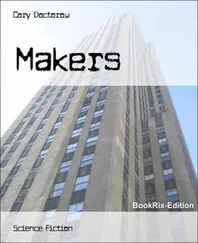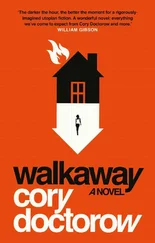Cory Doctorow - Someone Comes to Town, Someone Leaves Town
Здесь есть возможность читать онлайн «Cory Doctorow - Someone Comes to Town, Someone Leaves Town» весь текст электронной книги совершенно бесплатно (целиком полную версию без сокращений). В некоторых случаях можно слушать аудио, скачать через торрент в формате fb2 и присутствует краткое содержание. Год выпуска: 2005, ISBN: 2005, Издательство: Tor Books, Жанр: Киберпанк, на английском языке. Описание произведения, (предисловие) а так же отзывы посетителей доступны на портале библиотеки ЛибКат.
- Название:Someone Comes to Town, Someone Leaves Town
- Автор:
- Издательство:Tor Books
- Жанр:
- Год:2005
- ISBN:0765312786
- Рейтинг книги:5 / 5. Голосов: 1
-
Избранное:Добавить в избранное
- Отзывы:
-
Ваша оценка:
- 100
- 1
- 2
- 3
- 4
- 5
Someone Comes to Town, Someone Leaves Town: краткое содержание, описание и аннотация
Предлагаем к чтению аннотацию, описание, краткое содержание или предисловие (зависит от того, что написал сам автор книги «Someone Comes to Town, Someone Leaves Town»). Если вы не нашли необходимую информацию о книге — напишите в комментариях, мы постараемся отыскать её.
Someone Comes to Town, Someone Leaves Town — читать онлайн бесплатно полную книгу (весь текст) целиком
Ниже представлен текст книги, разбитый по страницам. Система сохранения места последней прочитанной страницы, позволяет с удобством читать онлайн бесплатно книгу «Someone Comes to Town, Someone Leaves Town», без необходимости каждый раз заново искать на чём Вы остановились. Поставьте закладку, и сможете в любой момент перейти на страницу, на которой закончили чтение.
Интервал:
Закладка:
This materialized a new lecture in his mind, one about the proper role of low-hanging fruit, a favorite topic of MBAs who’d patronize his stores and his person, giving him unsolicited advice on the care and feeding of his shops based on the kind of useless book-learning and jargon-slinging that Fortune 100 companies apparently paid big bucks for. When an MBA said “low-hanging fruit,” he meant “easy pickings,” something that could and should be snatched with minimal effort. But real low-hanging fruit ripens last, and should be therefore picked as late as possible. Further, picking the low-hanging fruit first meant that you’d have to carry your bushel basket higher and higher as the day wore on, which was plainly stupid. Low-hanging fruit was meant to be picked last. It was one of the ways that he understood people, and one of the kinds of people that he’d come to understand. That was the game, after all—understanding people.
So the floors would come last, after the molding, after the stairs, after the railings and the paneling. The railings, in particular, were horrible bastards to get clean, covered in ten or thirty coats of enamel of varying colors and toxicity. Alan spent days working with a wire brush and pointed twists of steel wool and oozing stinging paint stripper, until the grain was as spotless and unmarked as the day it came off the lathe.
Then he did the floors, using the big rotary sander first. It had been years since he’d last swung a sander around—it had been when he opened the tin-toy shop in Yorkville and he’d rented one while he was prepping the place. The technique came back to him quickly enough, and he fell into a steady rhythm that soon had all the floors cool and dry and soft with naked, exposed woody heartmeat. He swept the place out and locked up and returned home.
The next day, he stopped at the Portuguese contractor-supply on Ossington that he liked. They opened at five a.m., and the men behind the counter were always happy to sketch out alternative solutions to his amateur construction problems, they never mocked him for his incompetence, and always threw in a ten percent “contractor’s discount” for him that made him swell up with irrational pride that confused him. Why should the son of a mountain need affirmation from runty Portugees with pencil stubs behind their ears and scarred fingers? He picked up a pair of foam-rubber knee pads and a ten-kilo box of lint-free shop rags and another carton of disposable paper masks.
He drove to the house on Wales Avenue, parked on the lawn, which was now starting to thaw and show deep muddy ruts from his tires. He spent the next twelve hours crawling around on his knees, lugging a tool bucket filled with sandpaper and steel wool and putty and wood-crayons and shop rags. He ran his fingertips over every inch of floor and molding and paneling, feeling the talc softness of the sifted sawdust, feeling for rough spots and gouges, smoothing them out with his tools. He tried puttying over the gouges in the flooring that he’d seen the day he took possession, but the putty seemed like a lie to him, less honest than the gouged-out boards were, and so he scooped the putty out and sanded the grooves until they were as smooth as the wood around them.
Next came the beeswax, sweet and shiny. It almost broke his heart to apply it, because the soft, newly exposed wood was so deliciously tender and sensuous. But he knew that wood left to its own would eventually chip and splinter and yellow. So he rubbed wax until his elbows ached, massaged the wax into the wood, buffed it with shop rags so that the house shone.
Twenty coats of urethane took forty days—a day to coat and a day to dry. More buffing and the house took on a high shine, a slippery slickness. He nearly broke his neck on the slippery staircase treads, and the Portuguese helped him out with a bag of clear grit made from ground walnut shells. He used a foam brush to put one more coat of urethane on each tread of the stairs, then sprinkled granulated walnut shells on while it was still sticky. He committed a rare error in judgment and did the stairs from the bottom up and trapped himself on the third floor, with its attic ceilings and dormer windows, and felt like a goddamned idiot as he curled up to sleep on the cold, hard, slippery, smooth floor while he waited for his stairs to dry. The urethane must be getting to his head.
The bookcases came out of the cellar one by one. Alan wrestled them onto the front porch with Tony’s help and sanded them clean, then turned them over to Tony for urethane and dooring.
The doors were UV-filtering glass, hinged at the top and surrounded by felt on their inside lips so that they closed softly. Each one had a small brass prop-rod on the left side that could brace it open. Tony had been responsible for measuring each bookcase after he retrieved it from Alan’s protégés’ shops and for sending the measurements off to a glazier in Mississauga.
The glazier was technically retired, but he’d built every display case that had ever sat inside any of Alan’s shops and was happy to make use of the small workshop that his daughter and son-in-law had installed in his garage when they retired him to the burbs.
The bookcases went into the house, along each wall, according to a system of numbers marked on their backs. Alan had used Tony’s measurements and some CAD software to come up with a permutation of stacking and shouldering cases that had them completely covering every wall—except for the wall by the mantelpiece in the front parlor, the wall over the countertop in the kitchen, and the wall beside the staircases—to the ceiling.
He and Tony didn’t speak much. Tony was thinking about whatever people who drive moving vans think about, and Alan was thinking about the story he was building the house to write in.
May smelled great in Kensington Market. The fossilized dog shit had melted and washed away in the April rains, and the smells were all springy ones, loam and blossoms and spilled tetrapak fruit punch left behind by the pan-ethnic street-hockey league that formed up spontaneously in front of his house. When the winds blew from the east, he smelled the fish stalls on Spadina, salty and redolent of Chinese barbecue spices. When it blew from the north, he smelled baking bread in the kosher bakeries and sometimes a rare whiff of roasting garlic from the pizzas in the steaming ovens at Massimo’s all the way up on College. The western winds smelled of hospital incinerator, acrid and smoky.
His father, the mountain, had attuned Art to smells, since they were the leading indicators of his moods, sulfurous belches from deep in the caverns when he was displeased, the cold non-smell of spring water when he was thoughtful, the new-mown hay smell from his slopes when he was happy. Understanding smells was something that you did, when the mountain was your father.
Once the bookcases were seated and screwed into the walls, out came the books, thousands of them, tens of thousands of them.
Little kids’ books with loose signatures, ancient first-edition hardcovers, outsized novelty art books, mass-market paperbacks, reference books as thick as cinderblocks. They were mostly used when he’d gotten them, and that was what he loved most about them: They smelled like other people and their pages contained hints of their lives: marginalia and pawn tickets, bus transfers gone yellow with age and smears of long-ago meals. When he read them, he was in three places: his living room, the authors’ heads, and the world of their previous owners.
They came off his shelves at home, from the ten-by-ten storage down on the lakeshore, they came from friends and enemies who’d borrowed his books years before and who’d “forgotten” to return them, but Alan never forgot, he kept every book in a great and deep relational database that had begun as a humble flatfile but which had been imported into successive generations of industrial-grade database software.
Читать дальшеИнтервал:
Закладка:
Похожие книги на «Someone Comes to Town, Someone Leaves Town»
Представляем Вашему вниманию похожие книги на «Someone Comes to Town, Someone Leaves Town» списком для выбора. Мы отобрали схожую по названию и смыслу литературу в надежде предоставить читателям больше вариантов отыскать новые, интересные, ещё непрочитанные произведения.
Обсуждение, отзывы о книге «Someone Comes to Town, Someone Leaves Town» и просто собственные мнения читателей. Оставьте ваши комментарии, напишите, что Вы думаете о произведении, его смысле или главных героях. Укажите что конкретно понравилось, а что нет, и почему Вы так считаете.








